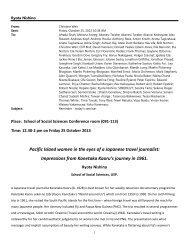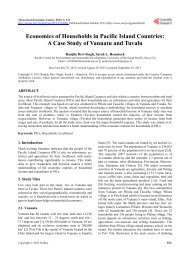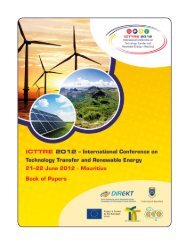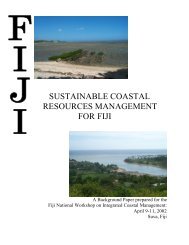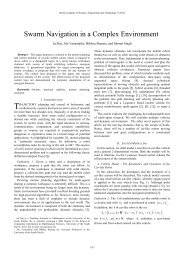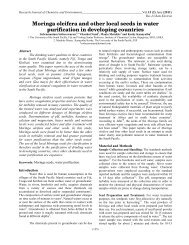Download - Fiji Institute of Accountants
Download - Fiji Institute of Accountants
Download - Fiji Institute of Accountants
Create successful ePaper yourself
Turn your PDF publications into a flip-book with our unique Google optimized e-Paper software.
Creativity and Innovation in education therefore<br />
can be seen as a generation <strong>of</strong> ideas, models etc.<br />
to improve the quality <strong>of</strong> outputs that come out<br />
<strong>of</strong> schools, colleges and Universities which can<br />
support economic and social development in the<br />
country. The National Center on Education and<br />
the Economy report (US) <strong>of</strong> 2006 raises some<br />
fundamental questions about creativity and<br />
innovation . They are as follows:<br />
1. What do we know about the sources <strong>of</strong><br />
creativity and innovation in individuals?<br />
2. What do we know about curricula and<br />
pedagogical techniques that have proven<br />
effective in promoting innovation and<br />
creativity through formal and informal<br />
education?<br />
3. What do we know about techniques that<br />
have been proven to stimulate creativity and<br />
innovation in workplace?<br />
4. What is it about the nature <strong>of</strong> our culture,<br />
our society and our economy that makes our<br />
country more creative and innovative than<br />
others?<br />
These questions are very relevant and we ought<br />
to ask the same questions if we are to move<br />
towards developing better creativity and<br />
innovation in education here in <strong>Fiji</strong>. Before I try<br />
and answer some <strong>of</strong> these questions let me say a<br />
few words about the role <strong>of</strong> education in<br />
development.<br />
Role <strong>of</strong> Education in Economic Development<br />
The broader issue <strong>of</strong> the role <strong>of</strong> education in<br />
economic development is now at the centre stage<br />
<strong>of</strong> education policies in most countries which<br />
see education as the driver for economic<br />
development. While people generally everywhere<br />
believe that education is beneficial for themselves<br />
and their children, there is a much bigger<br />
awareness about the correlation between<br />
education and income. On average the more<br />
educated people are, the higher the earnings for<br />
themselves and their families. In addition, there<br />
is a clear correlation between national income<br />
levels and educational attainment. More<br />
specifically, the contribution <strong>of</strong> education to<br />
economic growth is generally found to be<br />
positive and significant. Economists such as<br />
Adam Smith, John Stuart Mill and Alfred<br />
Marshall, long ago recognized the fact that<br />
education was good for growth. It was Alfred<br />
Marshall who said the following and I quote:<br />
“There is no extravagance more prejudicial to<br />
growth <strong>of</strong> national wealth than that wasteful<br />
negligence which allows genius that happens to<br />
be born <strong>of</strong> lowly parentage to expend itself in<br />
lowly work. No change would conduce so much<br />
to a rapid increase <strong>of</strong> material wealth as an<br />
improvement in our schools, and especially those<br />
<strong>of</strong> the middle grades, provided it be combined<br />
with an extensive system <strong>of</strong> scholarships, which<br />
will enable the clever son <strong>of</strong> a working man to<br />
rise gradually from school to school till he has<br />
the best theoretical and practical education<br />
which the age can give” (Marshall, 1920, p.176).<br />
Education also contributes to poverty reduction,<br />
improvement in income distribution and<br />
improvements in demographic and political<br />
development. In economics we talk about<br />
positive and negative externalities <strong>of</strong><br />
achievements and outcomes but for education<br />
we can say are only positive externalities. For<br />
example, the increased productivity <strong>of</strong> workers<br />
and co-workers and a general rise in the skills <strong>of</strong><br />
the labour force will generate further innovation,<br />
adaptability to new situations and<br />
entrepreneurship. Education at all level is<br />
important for economic growth.<br />
Rapid Global and Regional Economics Changes<br />
<strong>Fiji</strong> like most developing economies has under<br />
gone structural changes and will continue to face<br />
rapid -economic and social changes in the future.<br />
From being a largely agricultural country in the<br />
1970s and 1980s, <strong>Fiji</strong>’s economic structure<br />
changed rapidly in the last two decades where it<br />
has become a more service and trade-oriented<br />
10 June 2012. The FiJi AccounTAnT www.fia.org.fj



